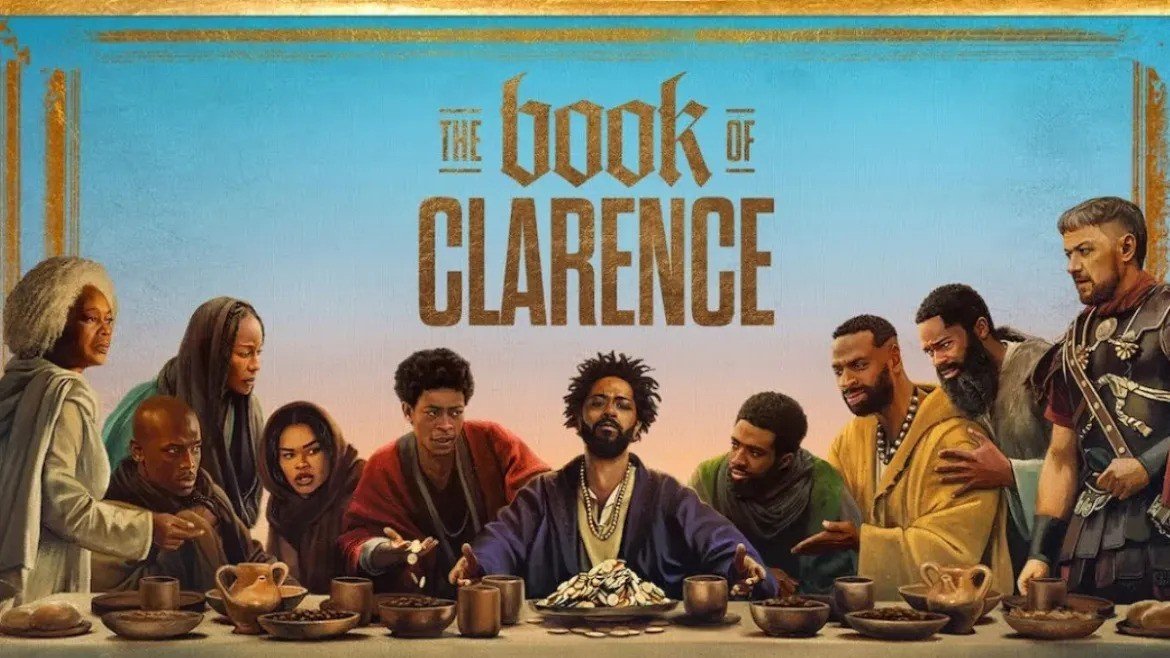Jenny and I have seen a couple of movies recently, Book of Clarence and American Fiction. Both movies have African American directors and casts for the most part. Book of Clarence is set in Jerusalem during the time of Jesus. Clarence is a ne’er-do-well hustler who admires Jesus’ work. Clarence assumes Jesus is faking the miracles though and he is intrigued by the idea of running his own messiah scam. This all ends predictably and the plot isn’t the strength. The reason you should see the movie is that at moments the film is fresh and original. And funny. The last supper scene is a beautifully choreographed set piece, hard to describe but worth the cost of admission. There is a dance scene at a party Clarence attends that sticks with me for its lighting, costumes, and energy. Book of Clarence has a funny take as well on where white Jesus comes from, which I appreciate.
Book of Clarence, like Clarence, is not perfect, but even with its flaws, go see it or stream it.
Cousin Roy and Julie came this weekend for a sleepover which has been fun as usual. We went to see American Fiction Friday night at the Carolina Cinemark, which is the best theater, don’t you think? Jeffrey Wright plays Monk in the lead. Monk is a college professor and writer who happens to be African American. But he has trouble getting published because he doesn’t write about “the African American experience” as defined by the literary community and the reading public. Monk rebels against the apparent necessity of being an African American author instead of just being an author who can write about anything. In a fit of pique and financial desperation he pens a pandering novel peopled with black gangsters and drugs entitled My Pafology. He sends it for publication under the pseudonym Staag R Leigh, who is supposedly an ex-con and wanted by the police. To Monk’s shock, but no one else’s, the book sells like hot cakes and is quickly collecting literary prizes.

There is a lot to think about here. Should literature be true? If an author makes up a story that sells and moves his/her audience, is that cheating… or art? Comedian Hasan Minhaj has recently gotten critical press for inventing or embellishing some of his stories, i.e comedy routines. If you don’t know, Minaj tells funny and touching stories about growing up as a Muslim in the U.S., stories about his family and girlfriends, and their families. If he embellishes, is he lying? Or just being a creative artist? I’m inclined to give him the benefit of the doubt.
The novel American Dirt was controversial for the same reason. White Author Jeannine Cummins tells the story of struggling Latino immigrants coming north and crossing into the U.S. Is that her story to tell? Is she appropriating the suffering of others while gaining literary awards and economic gain? Or is she just telling a compelling story about an important topic? Does it matter who tells a story? I’m inclined not to give Cummins the benefit of the doubt. But I’m not sure why.
If you take this sort of thinking to its extreme, authors may only write as truthfully as possible about their own personal experience. That is about where I am now as a reader. But it is untenable because of, well, Shakespeare for example. Who is Shakespeare in his plays? Is he Hamlet, King Lear, or lady Macbeth? It is impossible to tell. And J.K Rowling is definitely not Harry Potter. I don’t want a literary world without Harry Potter or Hamlet. But when is it not ok to just make stuff up?
By the way I also accuse Faulkner and Flannery O’Conner of pandering. They wrote about the lowest of the low of southern culture for the amusement of the wealthy elite of New York City. Faulkner’s tale in Sanctuary of a woman raped with a corn cob is a classic pander. Faulkner admits it:
‘The whole enterprise was, Faulkner asserted, “a cheap idea, because it was deliberately conceived to make money.” When Smith(his NYC editor) had sent him the galleys, Faulkner wrote, there were only two choices: to tear the whole thing up or to rewrite it. Thinking “it might sell: maybe 10,000 of them will buy it” (notice the lovely arrogance of the “of them”), he decided to rewrite.’(Washington Post, 1981)
And don’t even get me started on As I Lay Dying. Reading it, it is obviously a comic novel. For example, it has a character who can’t work because he is allergic to sweat, which is the oldest of jokes among working people. At one point in this story about moving a dead woman in her coffin 20 miles to her burial site, the coffin slides off the wagon into a rushing stream and her family members ride the coffin downstream like a kayak, all while vultures hover close overhead. Hilarious and good for Faulkner.
But I think there are readers who somehow think Faulkner is telling them something deep and important about depraved southern white culture. Faulkner laughed all the way to the bank.
Faulkner felt the same contempt for his readers and literary culture as Monk does when he writes Pafology in American Fiction. It is something for a reader to consider.

Leave a comment